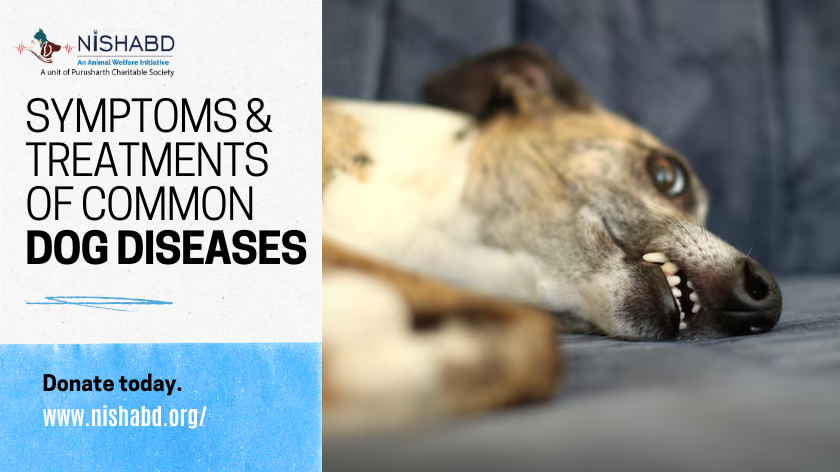Symptoms & Treatments of Common Dog Diseases
Many families love dogs, and those who own pets place a high value on their general well-being. Much like people, dogs can suffer from a variety of illnesses that have a negative impact on their lives. Being aware of the symptoms and treatments associated with common canine ailments will help ensure that your dog is happy and healthy. In this blog, we’ll cover some of the most common dog diseases and symptoms, the treatments available.
- Canine Parvovirus
Symptoms: Dogs are particularly vulnerable to the extremely contagious canine parvovirus. Severe diarrhea, bloody vomiting, fever, tiredness, and loss of appetite are some of its symptoms. Diarrhea and vomiting increase the danger of dehydration, and if the infection is not treated promptly, it can be fatal. It is one of the most common dog diseases.
Treatment: Supportive treatment is the main emphasis of treatment, as there is no specific cure for parvovirus. It consists of intravenous fluids to prevent dehydration, medications to treat vomiting and diarrhea, and antibiotics to prevent further infections. Usually, the dog needs to be hospitalized in order to get intensive medical care until they heal. The best method of protecting against parvovirus is vaccination. - Canine Distemper
Symptoms: Canine distemper is a different viral infection that is potentially dangerous. The signs include nasal discharge, coughing, a decreased appetite and a discharge from the eye. The disease is progressing and it could alter your nervous system, causing seizures, the twitching of your hands, and even paralysis.
Treatment: Similar to parvovirus, Distemper isn’t curable. Treatment is dependent on supportive treatment such as fluids, antibiotics for treating secondary infections, and medication to treat symptoms like seizures. A vaccine’s importance to prevent the spread of the disease is crucial since distemper can be contagious and spreads by contact. - Kennel Cough
Symptoms: Kennel cough or canine infectious tracheobronchitis is a respiratory illness which causes a chronic dry cough. It is often associated with nose discharges, wheezing as well as mild fever. While kennel-cough is not typically severe, it could be unpleasant for your dog and can result in more serious issues in dogs of all ages or puppies.
Treatment: The majority of forms of kennel dry will disappear by themselves within some weeks. Treatment options include antibiotics when an infection with a bacteria is present and cough suppressants to ease symptoms of cough and ensuring that the pet is in a warm and humid area to aid in breathing. Vaccines are readily available to guard against kennel-cough, particularly those dogs who are frequently in contact in a group with dogs. - Canine Heartworm Disease
Symptoms: Heartworm disease is caused by worms with parasites which reside within the lungs, the heart and blood vessels in affected dogs. The symptoms may not manifest until the condition is more advanced and can include fatigue, coughing, decreased appetite, loss of weight and a swelling of the abdomen because of the accumulation of fluid. The most severe cases may lead to heart failure and even death.
Treatment: The treatment for heartworms involves an injection program to destroy the adult worms followed by a regimen of medication to kill the larvae. The procedure can be difficult for a dog’s body, which is why it’s important to follow the advice of a vet. There are preventative medicines available, and must be administered frequently to guard against heartworm disease. - Lyme Disease
Symptoms: Lyme disease is an infection caused by bacteria that is transmitted through ticks. Dogs can experience symptoms such as lameness, fever, swelling of joints, a lack of appetite and fatigue. In certain instances, dogs can suffer from kidney issues or neurological issues if they are not addressed promptly.
Treatment: The main remedy to treat Lyme infection is using antibiotics most commonly amoxicillin or doxycycline. The majority of dogs are well-responsible for treatment and are able to recover quickly. The best way to prevent Lyme disease requires regular tick-control measures like using tick-preventatives as well as checking your dog for ticks following any outdoor activity. - Canine Influenza
Symptoms: Canine influenza, or dog flu is a contagious respiratory disease caused by influenza virus. The symptoms include sneezing, coughing nasal discharge and fever, as well as lethargy and a decreased appetite. In the most severe instances, pneumonia may develop that can lead to death.
Treatment: This involves fluids, rest and medication to treat symptoms. Antibiotics can be prescribed if secondary infections with bacteria occur. Vaccines are offered to guard against specific varieties of canine influenza. They are suggested for dogs that are at danger of being exposed. - Canine Arthritis
Symptoms: Arthritis is a common dog disease that can cause joint pain and stiffness. The signs include limping and difficulty standing up or lying down, resistance to climb stairs or jump as well as a decreased level of activity. Physical activity and cold weather can make symptoms worse.
Treatment: Although arthritis cannot be treated, there are a variety of treatments that are able to manage the signs and improve your dog’s overall quality of living. They include anti-inflammatory medicines as well as pain relief medications and joint supplements such as the glucosamine or chondroitin as well as weight management that reduces the strain on joints. Regular, gentle exercise can also be beneficial to keep mobility. - Allergies
Symptoms: Dogs suffer from allergies like humans. The symptoms include redness, itching as well as swelling on the face as well as the ear, sneezing, coughing, and digestive problems like diarrhea or vomiting. Allergies can trigger through food, environmental triggers (such as dust, pollen mold or mites) or even the bites of a flea.
Treatment: Treating allergies in dogs depends on identifying the underlying cause. Symptom management may involve antihistamines, corticosteroids, or other medications. Dogs with food allergies may require a personalized diet to avoid allergens. Regular grooming and using hypoallergenic products can help reduce environmental allergies. It is crucial to control fleas to prevent the development of flea allergy dermatitis. - Canine Epilepsy
Symptoms: Epilepsy is a neurological disorder that can trigger seizures for dogs. Seizures are characterized by sudden collapse, jerking, rigidity, muscle spasms, the loss of consciousness, crying and mouth foaming. The duration of a seizure can vary between a few seconds and more than a few minutes.
Treatment: There isn’t a cure for epilepsy but it is manageable by taking anticonvulsant medication. The aim in treatment is to decrease the frequency and intensity of seizures. Regular check-ups with a veterinarian are necessary to track your condition, and to adjust medication when needed. Finding and avoiding triggers for seizures can help in reducing the condition. - Canine Obesity
Symptoms:It is defined as excess body weight as well as fat. Some of the symptoms include difficulty breathing or snoring, a decrease in stamina, problems moving or walking in a seated position, and an increased chance of developing health problems such as diabetes, heart disease and arthritis.
Treatment: Mixing a regular workout routine with a well-balanced, managed diet is the basic treatment for overweight pets. Your veterinarian can help you design a weight loss program that is suitable for your dog’s needs. To reach and keep your dog at a healthy weight, you must closely monitor his or her development and make any required adjustments.
Conclusion
Being aware of the symptoms and treatment of common dog diseases is crucial for any pet owner. If you recognize the signs early and seek immediate medical attention, you will aid in keeping your dog healthy and content. Always seek advice from your vet if you observe some changes to your dog’s behavior or health, since early intervention could make a difference in the health of your dog.

